unit02
- 格式:doc
- 大小:123.50 KB
- 文档页数:47

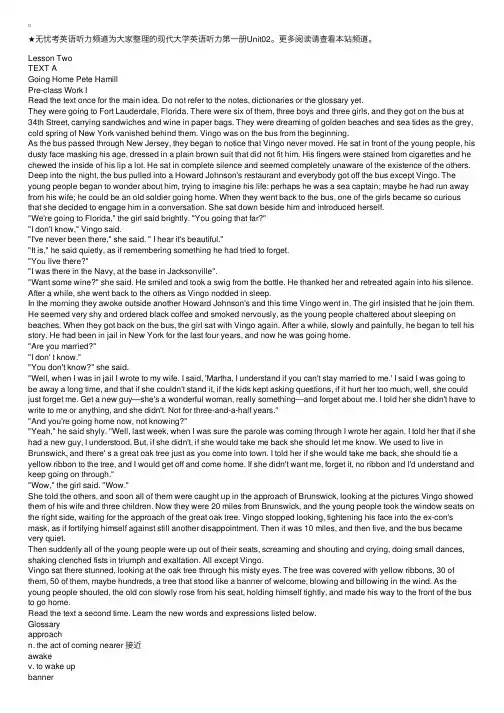
★⽆忧考英语听⼒频道为⼤家整理的现代⼤学英语听⼒第⼀册Unit02。
更多阅读请查看本站频道。
Lesson TwoTEXT AGoing Home Pete HamillPre-class Work IRead the text once for the main idea. Do not refer to the notes, dictionaries or the glossary yet.They were going to Fort Lauderdale, Florida. There were six of them, three boys and three girls, and they got on the bus at 34th Street, carrying sandwiches and wine in paper bags. They were dreaming of golden beaches and sea tides as the grey, cold spring of New York vanished behind them. Vingo was on the bus from the beginning.As the bus passed through New Jersey, they began to notice that Vingo never moved. He sat in front of the young people, his dusty face masking his age, dressed in a plain brown suit that did not fit him. His fingers were stained from cigarettes and he chewed the inside of his lip a lot. He sat in complete silence and seemed completely unaware of the existence of the others. Deep into the night, the bus pulled into a Howard Johnson's restaurant and everybody got off the bus except Vingo. The young people began to wonder about him, trying to imagine his life: perhaps he was a sea captain; maybe he had run away from his wife; he could be an old soldier going home. When they went back to the bus, one of the girls became so curious that she decided to engage him in a conversation. She sat down beside him and introduced herself."We're going to Florida," the girl said brightly. "You going that far?""I don't know," Vingo said."I've never been there," she said. " I hear it's beautiful.""It is," he said quietly, as if remembering something he had tried to forget."You live there?""I was there in the Navy, at the base in Jacksonville"."Want some wine?" she said. He smiled and took a swig from the bottle. He thanked her and retreated again into his silence. After a while, she went back to the others as Vingo nodded in sleep.In the morning they awoke outside another Howard Johnson's and this time Vingo went in. The girl insisted that he join them. He seemed very shy and ordered black coffee and smoked nervously, as the young people chattered about sleeping on beaches. When they got back on the bus, the girl sat with Vingo again. After a while, slowly and painfully, he began to tell his story. He had been in jail in New York for the last four years, and now he was going home."Are you married?""I don' t know.""You don't know?" she said."Well, when I was in jail I wrote to my wife. I said, 'Martha, I understand if you can't stay married to me.' I said I was going to be away a long time, and that if she couldn't stand it, if the kids kept asking questions, if it hurt her too much, well, she could just forget me. Get a new guy—she's a wonderful woman, really something—and forget about me. I told her she didn't have to write to me or anything, and she didn't. Not for three-and-a-half years.""And you're going home now, not knowing?""Yeah," he said shyly. "Well, last week, when I was sure the parole was coming through I wrote her again. I told her that if she had a new guy, I understood. But, if she didn't, if she would take me back she should let me know. We used to live in Brunswick, and there' s a great oak tree just as you come into town. I told her if she would take me back, she should tie a yellow ribbon to the tree, and I would get off and come home. If she didn't want me, forget it, no ribbon and I'd understand and keep going on through.""Wow," the girl said. "Wow."She told the others, and soon all of them were caught up in the approach of Brunswick, looking at the pictures Vingo showed them of his wife and three children. Now they were 20 miles from Brunswick, and the young people took the window seats on the right side, waiting for the approach of the great oak tree. Vingo stopped looking, tightening his face into the ex-con's mask, as if fortifying himself against still another disappointment. Then it was 10 miles, and then five, and the bus became very quiet.Then suddenly all of the young people were up out of their seats, screaming and shouting and crying, doing small dances, shaking clenched fists in triumph and exaltation. All except Vingo.Vingo sat there stunned, looking at the oak tree through his misty eyes. The tree was covered with yellow ribbons, 30 of them, 50 of them, maybe hundreds, a tree that stood like a banner of welcome, blowing and billowing in the wind. As the young people shouted, the old con slowly rose from his seat, holding himself tightly, and made his way to the front of the bus to go home.Read the text a second time. Learn the new words and expressions listed below.Glossaryapproachn. the act of coming nearer 接近awakev. to wake upbannern. a flag 旗帜billowv. to rise and roll in waves due to wind 飘扬;翻腾chatterv. to talk fast in a friendly way 聊天chewv. to keep biting repeatedly because one is nervousclenchadj. to hold one's hands or teeth together tightly because one is determined or angryengagev. to make (sb.) join with one in 使卷⼊,使参加exaltationn. joy, great happiness 兴奋,得意ex-conn. a former prisoner 刑满释放⼈员existencen. state of being 存在fitv. to be the right size or shape for sb. or sth.fortn. a strong building(s) used for defending an important place 要塞;usually capitalized as part of the name of a town, e.g. Fort Lauderdale in para. 1fortifyv. to make sb. feel physically or mentally stronger; to strengthen 使……更坚强guyn. a person; a fellowjailn. a prisonmaskv. to hide the truth about sth;maskn. originally a false face one wears to hide one's face; Here: an expression that hides one's true feelingsmistyadj. Here: full of tears 蒙眬不清的oakn. a kind of tree 橡树parolen. permission for sb. to leave a prison, on the condition that he promises to behave well 假释retreatv. to go back or away because one is afraid; Here: to stop paying attention to what is happening around you and give all your attention to your own thoughtsribbonn. narrow strips of cloth, often made of silk and used to decorate gifts 丝带;缎带screamv. to shout in a loud high voice when one is excitedstainv. to put a mark on sth. that can not be removed 沾上颜⾊stunv. to be greatly surprised or shocked ⽬瞪⼝呆swign. a large swallow ⼀⼤⼝tiden. levels to which the sea reaches on land 潮汐tightenv. to become tight or make tightertriumphn. a complete victory or success; a feeling of great pride or joy because of success or victoryunawareadj. not knowing or realizing what is happeningvanishv. to disappearwowint. (informal) an expression of surprise when one is deeply impressed or surprised 哇!yeahadv. the usual written form of a casual pronunciation of "yes"TEXT BA Homecoming of a Different SortVicki ViebruggeJeff and I had many conversations during the year, but I will always remember the time he told me about his family. His mother, a loving, caring woman, was the one who held the family together. She died shortly before Jeff graduated from high school. His father, a successful physician, cold and stern in Jeff's words, had firm beliefs that a person would never make a valuable contribution to the world unless they attended and graduated from college by the age of twenty-three. His father had even paved the way for Jeff to attend the same college from which he had graduated, and had offered to pay Jeff's entire tuition and living expenses. As an active Alumni Association member, he was excited that his son would someday follow in his footsteps.Jeff was twenty-seven and a successful business planner at a Fortune 500 company—without a degree. His passion was skiing. When he graduated from high school he decided to decline his father' s offer and instead move to Colorado to work with a ski patrol. With pain in his eyes Jeff told me that he still remembered the day he told his father he was going to give up college and take a job at a ski resort. He remembered every word of the short conversation. He told his father of his passion for skiing and for the mountains and then of his plans. His father looked off into the distance; his face became red. Then came the words that still echoed in Jeff's mind: "You lazy kid. No son of mine is going to work on a ski patrol and not attend college.I should have known you'd never amount to anything. Don't come back in this house until you have enough self-respect to use the brains God gave you and go to school!" The two had not spoken since that conversation.Jeff was not even sure that his father knew he was back in the area near where he grew up and he certainly did not want his father to know he was attending college. He was doing this for himself, not for his father. He said it over and over again. Janice, Jeff's sister, had always remained supportive of Jeff's decisions. She stayed in contact with their father, but Jeff had made her promise that she would not share any information about his life with him.Jeff's graduation ceremony that year was on a hot, sunny day in June. As I walked around talking to people before the ceremony, I noticed a man with a confused expression on his face."Excuse me, " he said as he politely approached me. "What is happening here today?""It's graduation day, " I replied, smiling."Well that's odd," he said, "my daughter asked me to meet her at this address." His eyes sparkled and he smiled. "Maybe she completed her associate' s degree and wanted to surprise me!"I helped him find a seat and as he left me he said, "Thank you for helping me. By the way, my name's Dr. Holstrom."I froze for a second. Jeff Holstrom. Dr. Holstrom. Could this be the same person I had heard about over the last year? The cold, stern man who demanded his son attend college or never enter his home again?Soon the familiar music could be heard. I turned around in my chair to get a glimpse of Dr. Holstrom. He seemed to be looking for his daughter amongst the graduates on stage. Speeches were given, the graduates were congratulated, and the dean began to read the names of the graduates.Jeff was the last person to cross the stage. I heard his name being announced "Jeff Holstrom." He crossed the stage, r e c e i v e d h i s d i p l o m a f r o m t h e c o l l e g e p r e s i d e n t , a n d , j u s t a s h e s t a r t e d d o w n t h e s t a i r s f r o m t h e s t a g e , h e t u r n e d t o w a r d t h e a u d i e n c e l o o k i n g f o r h i s s i s t e r . b r b d s f i d = " 1 6 1 " > A l o n e f i g u r e s t o o d u p i n t h e b a c k o f t h e a u d i e n c e D r . H o l s t r o m . I ' m n o t s u r e h o w J e f f e v e n s a w h i m i n t h e c r o w d , b u t I c o u l d t e l l t h a t t h e i r e y e s m e t . D r . H o l s t r o m o p e n e d h i s a r m s , a s i f t o e m b r a c e t h e a i r a r o u n d h i m . H e b o w e d h i s h e a d , a l m o s t a s i f t o a p o l o g i z e . F o r a m o m e n t i t s e e m e d a s i f t i m e s t o o d s t i l l , a n d a s i f t h e y w e r e t h e o n l y t w o i n t h e a u d i t o r i u m . J e f f c a m e d o w n t h e s t a i r s w i t h t e a r s i n h i s e y e s . b r b d s f i d = " 1 6 2 " > " M y f a t h e r i s h e r e , " h e w h i s p e r e d t o m e . I s m i l e d . b r b d s f i d = " 1 6 3 " > " W h a t a r e y o u g o i n g t o d o ? " I a s k e d h i m . b r b d s f i d = " 1 6 4 " > " W e l l , " h e s a i d , " I t h i n k I ' m g o i n g h o m e . " / p > / d i v > d i v i d = " f l o a t _ b t n " c l a s s = " " b d s f i d = " 1 6 5 " > b u t t o n c l a s s = " f l o a t _ b t n l e f t _ b t n " i d = " c o p y _ b u t t o n " d a t a - c l i p b o a r d - a c t i o n = " c o p y " d a t a - c l i p b o a r d - t a r g e t = " # c o n t e n t - t x t " o n c l i c k = " d o _ c o p y ( ) ; " b d s f i d = " 1 6 6 " > e m c l a s s = " i c o n " b d s f i d = " 1 6 7 " >。
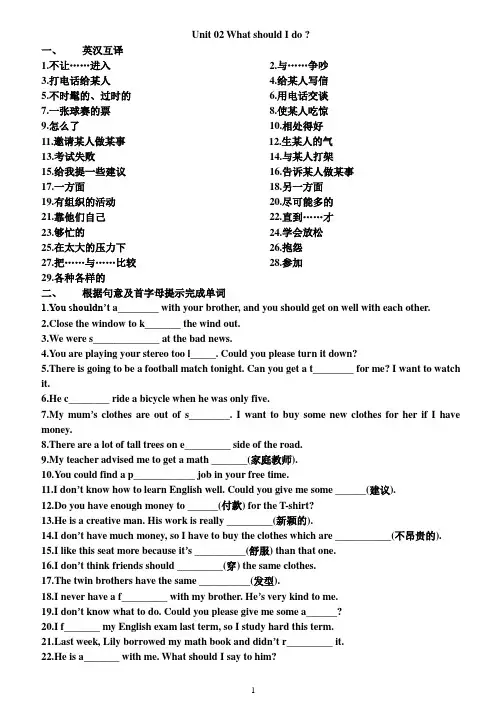
Unit 02 What should I do ?一、英汉互译1.不让……进入2.与……争吵3.打电话给某人4.给某人写信5.不时髦的、过时的6.用电话交谈7.一张球赛的票8.使某人吃惊9.怎么了10.相处得好11.邀请某人做某事12.生某人的气13.考试失败14.与某人打架15.给我提一些建议16.告诉某人做某事17.一方面18.另一方面19.有组织的活动20.尽可能多的21.靠他们自己22.直到……才23.够忙的24.学会放松25.在太大的压力下26.抱怨27.把……与……比较28.参加29.各种各样的二、根据句意及首字母提示完成单词1.You shouldn’t a________ with your brother, and you should get on well with each other.2.Close the window to k_______ the wind out.3.We were s_____________ at the bad news.4.You are playing your stereo too l_____. Could you please turn it down?5.There is going to be a football match tonight. Can you get a t________ for me? I want to watch it.6.He c________ ride a bicycle when he was only five.7.My mum’s clothes are out of s________. I want to buy some new clothes for her if I have money.8.There are a lot of tall trees on e_________ side of the road.9.My teacher advised me to get a math _______(家庭教师).10.You could find a p____________ job in your free time.11.I don’t know how to learn English well. Could you give me some ______(建议).12.Do you have enough money to ______(付款) for the T-shirt?13.He is a creative man. His work is really _________(新颖的).14.I don’t have much money, so I have to buy the clothes which are ___________(不昂贵的).15.I like this seat more because it’s __________(舒服) than that one.16.I don’t think friends should _________(穿) the same clothes.17.The twin brothers have the same __________(发型).18.I never have a f_________ with my brother. He’s very kind to me.19.I don’t know what to do. Could you please give me some a______?20.I f_______ my English exam last term, so I study hard this term.st week, Lily borrowed my math book and didn’t r_________ it.22.He is a_______ with me. What should I say to him?三、单项选择( )1.Don’t worry. He is ______ to look after little Betty.A.carefully enoughB.enough carefulC.careful enoughD.enough carefully ( )2.—I hear you have got a ticket ____ the basketball match.—Yes, I got it ____ my uncle. A.of,from B.to, by C.to, from D.or, to( )3.The teacher told my father ______ last night.A.call him upB.to call him upC.called up himD.to ring up him( )4.—__________? —My pen doesn’t work.A.What’s wrongB.Can I help youC.What’s itD.What’s matter( ) 5._____ my surprise, he passed the exam. A.For B.In C.To D.On( ) 6.I’m not happy, because I argued ______ my best friend ______ the gift .A.to, aboutB.as, onC.like, onD.with, about( ) 7.I need ______ some money to buy this CD player. What should I do?A.to getB.getC.gettingD.got( ) 8.I don’t often go to the movies, and Ann doesn’t , _____.A.tooB.alsoC.eitherD.as well( ) 9.Oh, you bought a second-hand car. How much did you ______ for it ?A.spendB.payC.takee( ) 10.Maybe you could buy some flowers _______ her. A.with B.for C.on D.to ( ) 11.—May I _____ your CD player? —Certainly, but you can’t _____ it to others.A.borrow, keepB.lend, keepC.keep, borrowD.borrow, lend( ) 12.Most of my classmates don’t like to talk with their parents, but I am ______ them. I love to talk with my parents. A.the same as B.different from C.interested in D.angry with ( ) 13.—Could I borrow your MP4? —Yes, of course you ______. A.can B.could C.will D.must( ) 14.My elder sister bought _____ for me yesterday afternoon.A.two clothesB.two clothingsC.two dressD.two pieces of clothing( ) 15.The teacher told him _____ late any more. A.not to be B.to be not C.be not D.not be( ) 16.Please do the same things ______ I do. A.like B.as C.so D.to( ) 17.If he doesn’t want to do the job, does ____ want to?A.everybody elseB.anybody elseC.else anybodyD.else everybody( )18.Maybe you can think of some good advice______ her. A.to B.for C.in D.with ( )19.—May I use your pen? —Sorry. I _______ it at home this morning.A.forgetB.leftC.have forgottenD.was leaving( ) 20.There are so many dolls in the shop. I really can’t decide _______.A.when to chooseB.what to chooseC.which one to chooseD.to choose which( ) 21.Can you invite Erin _____ tennis with us? A.to play B.plays C.playing D.play ( ) 22.Everybody has seen the film ______ Lucy. So she knows nothing about it.A.besidesB.andC.withD.except( ) 23.Zhang Yining ____ the national team in 1993 and then she _____ a lot of ping-pang matches. A.joins, takes part in B.joins, took part in C.joined, takes part inD.joined, took part in( ) 24.Write _______ and try not to make any mistakes.A.as careful as possibleB.as careful as you canC.most carefulD.more careful ( ) 25.The Greens _____ going to fly to England next month. A.is B.are C.will D.shall ( ) 26.It’s a serious problem. We can’t decide _____ Mr Harris comes back.A.whileB.sinceC.untilD.so( ) 27.Most young people find ______ exciting to watch a football match.A.itB.thisC.thatD.one( ) 28.His handwriting can’t be compared ______ his father. A.to B. with C.on D.for四、用所给词的适当形式填空1.We have lots of after-school activities. Our school life is very _____(color).2.The dress is very nice but __________(expensive), I’ll get it.3.Jane has _______(nice) clothes than Mary ______(do).4.Lucy’s haircut is the same as ________(me).5.My English teacher often wears _________(fashion) clothes.6.Mike was ________(invite) to Peter’s birthday party.7.Paul always thought he ______(be) popular at school.8.Yesterday Alan’s sister _______(lose) her sports clothes.9.We don’t know what __________(do) next.10.My classmates all went to the movies except ______(I).11.He is getting on ________(good) with his English.12.Everyone ____________(invite) to his birthday party yesterday.13.Let the boys _________(speak) English.14.You should_______(talk) about your problems with your parents.15.I want ____________(be) happy.16.They have _______(free) to do what they want to do.17.The students complain about ________(have) much homework to do.18.I saw a boy ________(cry) when I crossed the street.19.I am under too much __________(press).20.They really need time ________(play).21.Parents are trying _______(plan) their kid’s lives for them.22.The clothes are the same as my _________(friend).23.I find it hard ________(get) on well with him.24.I won’t tell him until he ______(come) back tomorrow.五、句型转换1.You should drink some hot water at once.(对划线部分提问) ___________ __________ I do ?2.What’s the matter with Kim?(同义句转换) ________ ________ _________ Kim?3.My clothes are not in style. (同义句转换) My clothes are _________ ________ style.4.I wrote a letter to my father yesterday. (同义句转换) I _________ _______ my father yesterday.5.Please remember to call me up. (同义句转换)Please remember to _______ _______ _______ _______.6.Anna paid 500 dollars for the new jacket. (同义句转换)Anna _______ 500 dollars ________ the new jacket.7.I borrowed a book from him yesterday. (同义句转换) He ________ a book ________ me yesterday.8.We should heip him write letters.(改为否定句) We __________ __________ him write letters.9.She bought me a new bike. (同义句转换) She bought ______ ______ ______ ______ .10.He has some bananas in the bag, and I have some, too. (改为否定句)He _______ _______ _______ bananas in the bag, and ______ _______ _______ _______, _________.11.You don’t have enough money, ________?(完成反义疑问句)12.I don’t know what I can do for my mistakes.(改为简单句)I don’t know ______ ______ _______ for my mistakes.13.Lily needs some money to buy gifts for her mother. (改为否定句)Lily _______ _______ _______ money to buy gifts for her mother.14.I’m twelve years old. My sister is twelve years old, too.(合并成一句话)I’m ______ ______ _______ _______ my sister.15.Li Lei had a fight with his brother yesterday. (同义句转换)Li Lei ___________ ________ his brother yesterday.16.The thief ran away as quickly as possible when he saw a policeman. (同义句转换)The thief ran away _______ _______ ________ ________ ________ when he saw a policeman. 17.I didn’t leave before he came back. (同义句转换) I ________ ________ _________ he came back.18.I find that to learn English well is difficult. (同义句转换)I find _______ _______ ________ learn English well.19.Some friends send him some money. (同义句转换)Some friends send some money ________ ________.20.My friend gets on well with his classmates.(对划线部分提问)_______ _______ your friend get on with his claeemates?Unit11、原句There will be fewer people.(P3)Fewer的用法Fewer 是few 的比较级,表示更少,用来修饰可数ne.g There will be fewer trees in the future.比较lessLess 是little 的比较级,也表示“更少”,但用来修饰不可数n2、原句I think I will live in an apartment with my best friends,because I don’t like living alone. Alone 与lonelyalone主要强调目前是一个人的状况,没有同伴。
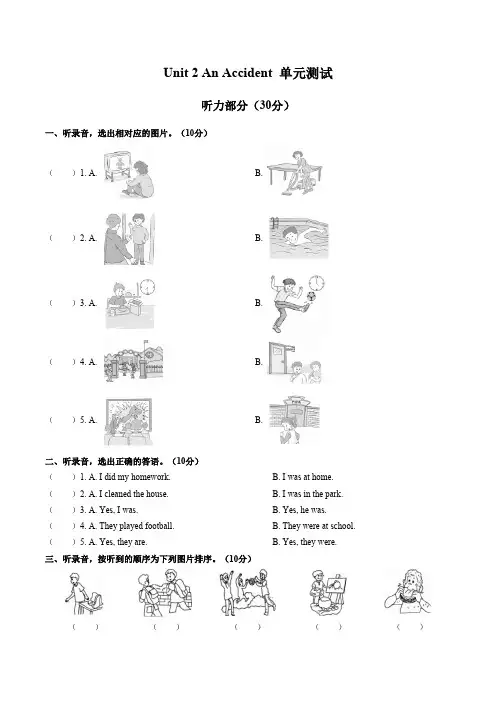
Unit 2 An Accident 单元测试听力部分(30分)一、听录音,选出相对应的图片。
(10分)()1. A. B.()2. A. B.()3. A. B.()4. A. B.()5. A. B.二、听录音,选出正确的答语。
(10分)()1. A. I did my homework. B. I was at home.()2. A. I cleaned the house. B. I was in the park.()3. A. Yes, I was. B. Yes, he was.()4. A. They played football. B. They were at school.()5. A. Yes, they are. B. Yes, they were.三、听录音,按听到的顺序为下列图片排序。
(10分)()()()()()笔试部分(70分)四、看图,从方框中选择正确的单词填空。
(10分)1. Kate ________ a cake last Sunday.2. My mother ________ shopping last week.3. Sam ________ up early this morning.4. Ken ________ football yesterday.5. Lingling ________ an ice cream yesterday.五、为下列句子找到相应的图片。
(10分)A. B. C. D. E.( )1. My mother was a teacher before.( )2. My sister did her homework last night.( )3. Bill swam last Sunday.( )4. Ken played football yesterday.()5. Bob watched TV last Saturday.六、将每幅图片与相应的句子连线。
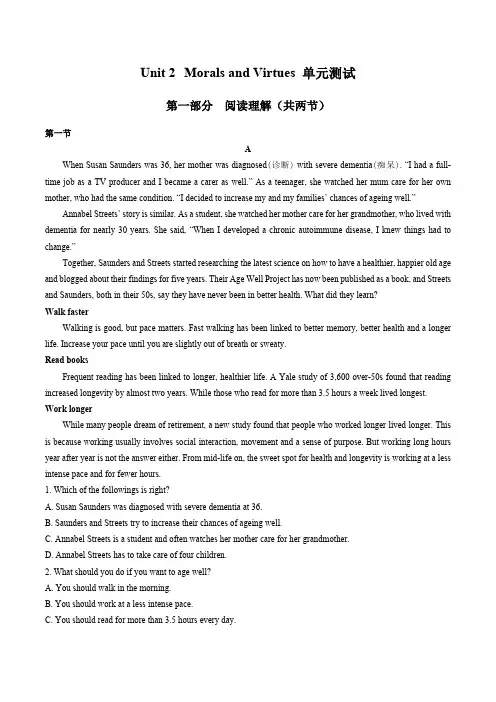
Unit 2Morals and Virtues 单元测试第一部分阅读理解(共两节)第一节AWhen Susan Saunders was 36, her mother was diagnosed(诊断) with severe dementia(痴呆). “I had a full-time job as a TV producer and I became a carer as well.” As a teenager, she watched her mum care for her own mother, who had the same condition. “I decided to increase my and my families’ chances of ageing well.”Annabel Streets’ story is similar. As a student, she watched her mother care for her grandmother, who lived with dementia for nearly 30 years. She said, “When I developed a chronic autoimmune disease, I knew things had to change.”Together, Saunders and Streets started researching the latest science on how to have a healthier, happier old age and blogged about their findings for five years. Their Age Well Project has now been published as a book, and Streets and Saunders, both in their 50s, say they have never been in better health. What did they learn?Walk fasterWalking is good, but pace matters. Fast walking has been linked to better memory, better health and a longer life. Increase your pace until you are slightly out of breath or sweaty.Read booksFrequent reading has been linked to longer, healthier life. A Yale study of 3,600 over-50s found that reading increased longevity by almost two years. While those who read for more than 3.5 hours a week lived longest. Work longerWhile many people dream of retirement, a new study found that people who worked longer lived longer. This is because working usually involves social interaction, movement and a sense of purpose. But working long hours year after year is not the answer either. From mid-life on, the sweet spot for health and longevity is working at a less intense pace and for fewer hours.1. Which of the followings is right?A. Susan Saunders was diagnosed with severe dementia at 36.B. Saunders and Streets try to increase their chances of ageing well.C. Annabel Streets is a student and often watches her mother care for her grandmother.D. Annabel Streets has to take care of four children.2. What should you do if you want to age well?A. You should walk in the morning.B. You should work at a less intense pace.C. You should read for more than 3.5 hours every day.D. You should work at a less intense pace and for fewer hours from mid-life on.3. What does the passage mainly talk about?A. Saunders found that people who worked longer lived longer.B. Saunders and Streets apply the healthy lifestyle to their own lives.C. Saunders and Streets’ experiences and ways to live well into old age.D. Streets found that those who read for more than 3.5 hours a week lived longest.BTribes(部落) in South Africa traditionally greet each other with “Sawabona.” which means “I see you.” The response is “Sikhona,” which translates to “I’m here.” As I watch my students finish up this busy school year, I’m making sure they feel that I know they are here at school and here in my life.At the beginning of the year, I ask my students’ parents to write me a letter telling me what they think I should know about their student. After all, they know their child best.One parent letter this year brought tears to my eyes.This mom wrote to me that when she asked her son about how he felt about his fourth-grade year, he got very quiet and wouldn’t look at her. When pressed, he eventually replied with tears streaming down his face and whispered, “No one saw me last year.” This inspired me to make this student (and all my students) feel seen this year.In spite of higher-class sizes and strict learning standards, I tried my best.My favorite part of every school day is that I stand at our classroom door to greet each and every student as they enter our room. It is important that I make a physical connection with each student in the form of a hug, handshake or high five. I make a verbal connection with each student as I check in with them. I ask about how their soccer game went, if they finished the homework, or if their grandma is feeling better. It only takes a few minutes but it pays back in priceless ways through relationships.I have two weeks left to connect with these students. I’m going to make the most of every minute I have left with them. To see them. To acknowledge that they are here.4. What inspired the author to make his students feel seen this year?A. One of his student’s tears.B. One of his student’s letter.C. One of his student’s homework.D. One of his students’ parent’s letter.5. The best title of the passage is ?A. Sawabona: I See You.B. Sikhona.C. a verbal connection.D. A hug.6. Which column(栏目) of the newspaper does the passage belong to?A. Health.B. Sports.C. Science.D. Education.第二节根据短文内容,从短文后的选项中选出能填入空白处的最佳选项。
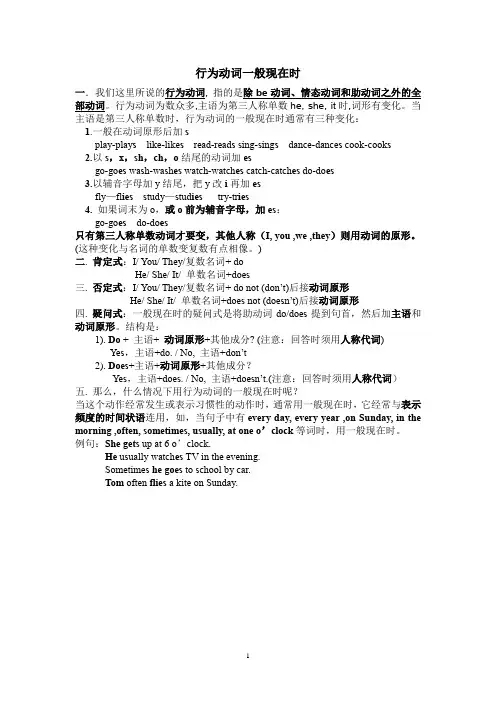
行为动词一般现在时一.我们这里所说的行为动词, 指的是除be动词、情态动词和助动词之外的全部动词。
行为动词为数众多,主语为第三人称单数he, she, it时,词形有变化。
当主语是第三人称单数时,行为动词的一般现在时通常有三种变化:1.一般在动词原形后加splay-play s like-like s read-read s sing-sing s dance-dance s cook-cook s2.以s,x,sh,ch,o结尾的动词加esgo-go es wash-wash es watch-watch es catch-catch es do-do es3.以辅音字母加y结尾,把y改i再加esfly—fl ies study—stud ies try-tr ies4.如果词末为o,或o前为辅音字母,加es:go-go es do-do es只有第三人称单数动词才要变,其他人称(I, you ,we ,they)则用动词的原形。
(这种变化与名词的单数变复数有点相像。
)二. 肯定式:I/ You/ They/复数名词+ doHe/ She/ It/ 单数名词+does三. 否定式:I/ You/ They/复数名词+ do not (don’t)后接动词原形He/ She/ It/ 单数名词+does not (doesn’t)后接动词原形四. 疑问式:一般现在时的疑问式是将助动词do/does提到句首,然后加主语和动词原形。
结构是:1). Do + 主语+ 动词原形+其他成分? (注意:回答时须用人称代词)Yes,主语+do. / No, 主语+don’t2). Does+主语+动词原形+其他成分?Yes,主语+does. / No, 主语+doesn’t.(注意:回答时须用人称代词)五. 那么,什么情况下用行为动词的一般现在时呢?当这个动作经常发生或表示习惯性的动作时,通常用一般现在时,它经常与表示频度的时间状语连用,如,当句子中有every day, every year ,on Sunday, in the morning ,often, sometimes, usually, at one o’clock等词时,用一般现在时。
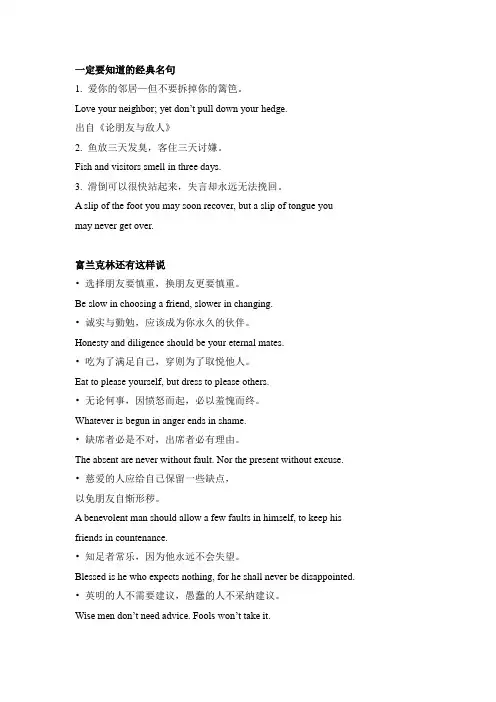
一定要知道的经典名句1. 爱你的邻居—但不要拆掉你的篱笆。
Love your neighbor; yet don’t pull down your hedge.出自《论朋友与敌人》2. 鱼放三天发臭,客住三天讨嫌。
Fish and visitors smell in three days.3. 滑倒可以很快站起来,失言却永远无法挽回。
A slip of the foot you may soon recover, but a slip of tongue you may never get over.富兰克林还有这样说•选择朋友要慎重,换朋友更要慎重。
Be slow in choosing a friend, slower in changing.•诚实与勤勉,应该成为你永久的伙伴。
Honesty and diligence should be your eternal mates.•吃为了满足自己,穿则为了取悦他人。
Eat to please yourself, but dress to please others.•无论何事,因愤怒而起,必以羞愧而终。
Whatever is begun in anger ends in shame.•缺席者必是不对,出席者必有理由。
The absent are never without fault. Nor the present without excuse. •慈爱的人应给自己保留一些缺点,以免朋友自惭形秽。
A benevolent man should allow a few faults in himself, to keep his friends in countenance.•知足者常乐,因为他永远不会失望。
Blessed is he who expects nothing, for he shall never be disappointed. •英明的人不需要建议,愚蠢的人不采纳建议。
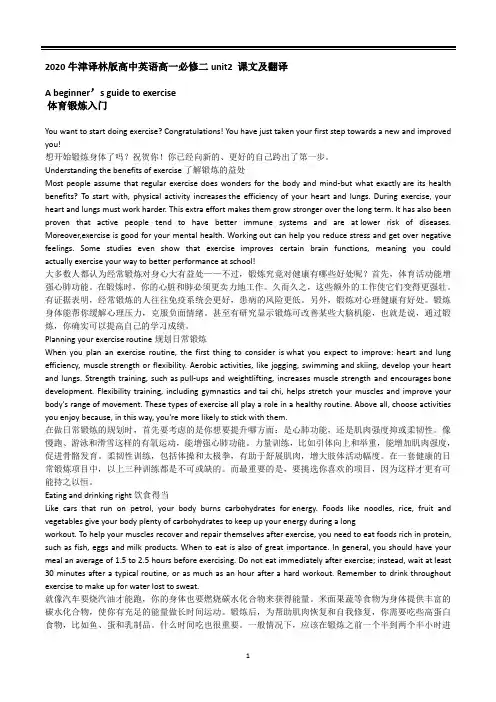
2020牛津译林版高中英语高一必修二unit2 课文及翻译A beginner’s guide to exercise体育锻炼入门You want to start doing exercise? Congratulations! You have just taken your first step towards a new and improved you!想开始锻炼身体了吗?祝贺你!你已经向新的、更好的自己跨出了第一步。
Understanding the benefits of exercise了解锻炼的益处Most people assume that regular exercise does wonders for the body and mind-but what exactly are its health benefits? To start with, physical activity increases the efficiency of your heart and lungs. During exercise, your heart and lungs must work harder. This extra effort makes them grow stronger over the long term. It has also been proven that active people tend to have better immune systems and are at lower risk of diseases. Moreover,exercise is good for your mental health. Working out can help you reduce stress and get over negative feelings. Some studies even show that exercise improves certain brain functions, meaning you could actually exercise your way to better performance at school!大多数人都认为经常锻炼对身心大有益处——不过,锻炼究竟对健康有哪些好处呢?首先,体育活动能增强心肺功能。
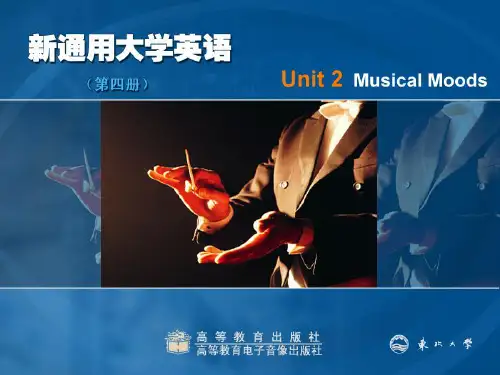
![中职英语职业模块 unit02[优讲课堂]](https://uimg.taocdn.com/2028cb8b3186bceb18e8bb4f.webp)
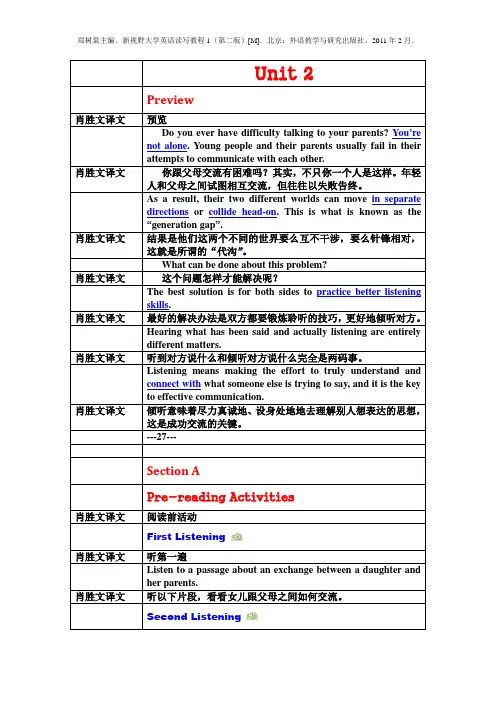
Unit 2Preview肖胜文译文预览Do you ever have difficulty talking to your parents? You’re not alone. Young people and their parents usually fail in theirattempts to communicate with each other.肖胜文译文你跟父母交流有困难吗?其实,不只你一个人是这样。
年轻人和父母之间试图相互交流,但往往以失败告终。
As a result, their two different worlds can move in separatedirections or collide head-on. This is what is known as the“generation gap”.肖胜文译文结果是他们这两个不同的世界要么互不干涉,要么针锋相对,这就是所谓的“代沟”。
What can be done about this problem?肖胜文译文这个问题怎样才能解决呢?The best solution is for both sides to practice better listeningskills.肖胜文译文最好的解决办法是双方都要锻炼聆听的技巧,更好地倾听对方。
Hearing what has been said and actually listening are entirelydifferent matters.肖胜文译文听到对方说什么和倾听对方说什么完全是两码事。
Listening means making the effort to truly understand andconnect with what someone else is trying to say, and it is the keyto effective communication.肖胜文译文倾听意味着尽力真诚地、设身处地地去理解别人想表达的思想,这是成功交流的关键。
新目标英语八年级下单元练习题精选 Unit02一、词汇:根据要求改写单词1.loud (副词)____ 2. wrong(反义)____3. could (原形)____4. surprise(形容词)____5. either(反义)____6. nice(比较级)____7. push(形容词)____8. they(翻身代词)____9. could not(缩写)____10. cheap (同义)____二、翻译短语1.与...吵架____2. 索要____3. 向....借____4. 讨论... ____5. 不让...进入____6. 过时了____7. 为...付款,赔偿____8. 给....买.... ____9. 寻找____10. 为....而准备____11. 与...相处融洽____12. 各种各样的____13. 在一方面...,在另一方面,... ____14. 做....的时间到了。
____15. 抱怨... ____16. 足够的钱____17. What's wrong? ____18. call sb. Up ____19. write sb. a letter=write a letter to sb. ____20. the same as ____21. by oneself ____22. not .... until.... ____23. as soon as possible ____24. as much as possible ____25. take part in ____26. under too much pressure ____27. be like ____28. be always doing sth. ____29. have a fight with ____三、单项选择( )1. Everyone of my class went camping______me, because I was ill in bed.A. withB. exceptC. besidesD. as well( )2. If you don't go, I won't, ______.A. tooB. eitherC. alsoD. neither( )3. If you lost the book, you must ____ it.A. pay forB. ask forC. leave forD. spend for( )4. You shouldn't ask your parents___ money.A. forB. onC. aboutD. with( )5. I didn't watch Tv __ I finished homework.A. afterB. whenC. whileD. until( )6. The tired students ____ go to bed ____ eleven o'clock.A. can't, untilB. not, untilC. doesn't, untilD. /, until( )7. --When will the train arrive?--You can ____ the time from the timetable. (时刻表)A. leave outB. look outC. find outD. keep out( )8. --I don't know _____.--What's wrong? Can I help you?A. What should I do?B. What's wrong?C. What to do .D. how to do.( )9. All my class went camping ___me.A. withB. exceptC. as wellD. besides ( )10. If you don't go, I won't go, ____.A. tooB. neitherC. alsoD. either ( )11. If you lose (丢失) the library book, youhave to _____ it.A. pay forB. ask forC. leave forD. spend for( )12. It's about five _____ away.A. hundreds of metersB. hundred metersC. hundred of metersD. hundreds of meter ( )13. We should ____ each other.A. learningB. learn fromC. to learn fromD. learning from( )14. They doesn't get home ____ 9:00 pm.A. tillB. afterC. whileD. until ( )15. He found ____ hard to learn maths well.A. itB. thatC. thisD. one( )16. Mrs Green told the boy ____ soccerin the classroom.A. not playB. doesn't playC. didn't playD. not to play( )17. Where is Lily? We are all here ___ her?A. besidesB. besideC. withD. except ( )18.You should ___ your library book on time.A. giveB. passC. turnD. return ( )19. Teacher asked all the students_______loudly in the classroom.A. not speakB. not to speakC. to not speakD. don't speak( )20. I think children today are ____.A. busy enoughB. enough busyC. too much busyD. under too pressure ( )21. Children today are under ____ pressure.A. too manyB. too muchC. much tooD. so many( )21. She is busy, I'm busy, _____.A. tooB. eitherC. alsoD. both( )22. Some parents are always comparing theirchildren ____ other children.A. forB. toC. withD. as( )23. Don't worry about the kids. I think theycan do it ________.A. alongB. by myselfC.by themselvesD. by theirselves( )24. When I came back from school, mumwas busy _____ in the kitchen.A. cookB. to cookC. cooksD. cooking三、句型转换1.They'll finish building the house in 2 weeks. (提问) ___ ____ ____ they finish building the house?2. I found it is easy to get on with others. (同义)I found ___ ____ to get on with others.3. The dictionary cast me fifty yuan. (同义)I _____ fifty yuan ____ the dictionary.4. Why not ask your parents for some money? (同义) Why _____ _____ ask your parents for somemoney?5. He seems to know nothing about it.(同义)____ _____ that he knows nothing about it.6. The boy seems happy.(同义)The boy seems _____ _____ happy.7. You should buy me a new bike .(同义)You should ______ a new bike ____ me.8. Erin should tell him the story.(否定)Erin _______ tell him the story.9. You should buy him a ticket.(同义)You should ____ a ticket ____ him.10. The tired man didn't get home until ten. (同义) The tired man _______ home _______ ten.四、汉译英1. 我想你可以向警察求助。
Unit 2Part 1AKey wordsLanguageDialoguesDialects:A regional variety of a language distinguished by pronunciation, grammar, or vocabulary, especially a variety of speech differing from the standard literary language or speech pattern of the culture in which it exists:地方话, 语音、语法或词汇均有区别的地区性语言变体,特别是存在于标准文学语言或文化口语模式的口语变体:Cockney is a dialect of English.伦敦方言是英语中的地区性语言A variety of language that with other varieties constitutes a single language of which no single variety is standard:方言所有这些变体会在一起组成一种单一的语言,而其中任一变体均不是标准的:the dialects of Ancient Greek.古希腊方言The language peculiar to an occupational group or a particular social class; jargon:某一职业(或集团)人员的用语一个专业集团或特定的社会阶级特有的语言;行话:the dialect of science.科学术语The manner or style of expressing oneself in language or the arts.语调用语言或艺术表达自己的方式或风格A language considered as part of a larger family of languages or a linguistic branch:语支作为较大语系一部分的语言或者是一种语言分支:Spanish and French are Romance dialects.西班牙语和法语是拉丁语中的一支Official languageV ocabularydisc: diskSomalia索马里A country of extreme eastern Africa on the Gulf of Aden and the Indian Ocean. Arab and Persiantraders first established outposts in the region between the seventh and tenth centuries. The present state was formed in 1960from colonies previously held by Italy and Great Britain. Mogadishu is the capital and the largest city. Population, 3,645,000.索马里非洲最东部的一个国家,临亚丁湾和印度洋。
从7世纪至10世纪之间,阿拉伯及波斯商贸者首先在这个地区建立了基地。
今天的索马里成立于1960年,在此之前它是由意大利和大不列颠占领的殖民地。
首都摩加迪沙,是全国最大的城市。
人口3,645,000TAPESCRIPT1.2, 700 languages / 7, 000 dialects / regional/ pronunciation2.o fficial language3.O ne billion / 20 percent4.F our hundred million / first/ 600 million / second / foreign5.500, 000 words / Eighty percent /other6.E ighty percent / computers7.A frican country / same8.1, 000 / Africa9.s paceship / 1997 / 55 / message / theUnited NationsB.Key wordslearning stylesense意思,意义感觉;知觉;感知He has a good sense of smell.他的嗅觉很灵敏。
A sense of humour is a great asset for a person. (喻)幽默感是一个人的宝贵资产。
理解力;鉴赏力;辨识力a good business sense有经济头脑A driver has a good sense / bump of locality. 司机对于方位有很强的辨识力。
观念;意识;意念见识,见地;判断力(pl) 理智;神智;思维的能力Have you taken lost your senses?你失去理智了吗?hearing learnersvisual learnerstactile learnersV ocabularyvisual看到的visual knowledge of a place 对一个地方的实地观察形象化的visual arts视觉艺术视觉的;视力的tactileadj.有触觉的a tactile sensation触觉触觉的,与触觉有关的a tactile organ触觉器官a tactile anesthesia触觉缺失1. Different people have different ways of learning.2. We call this your “learning style”and it’s based on your senses.3. To learn , you need to use your different senses —hearing, seeing,touching, etc., to bring information to your brain.4. Now, most people use one of their senses more than the others.5. Some people learn best by listening.6. They are called hearing learners.7. And others learn best by reading or looking at pictures.8. They are called visual learners.9.And some learn best by touching anddoing things.10.They are called tactile learners.11.Now, scientists don’t know whypeople use one sense more than the others.12. Maybe the sense they use most just works best for them.C.Key wordslanguage learning stylesanalytical分析的, 解析的communicative analyticalauthority-orientedconcrete具体的;实在的;有形的Beauty is not concrete but a door is.美丽不是具体物,但门是。
Have you any concrete suggestions on how to deal with these difficulties? (喻)"对怎样解决这些困难,你有没有什么具体建议?"确定的;清楚的混凝土,三合土;凝结物reinforced concrete钢筋混凝土concrete mixer混凝土搅拌机vocabularyidentify认出;识别;鉴定The markings are so blurred that it is difficult to identify.标记模糊不清,难以识别。
I identified the jacket at once; it was my brother's."我立即认出了那件外套,它是我兄弟的。
" (与with连用)认为同一He identifies beauty with goodness.他认为美与善是一致的。
(与with连用)与…有关系That politician is too closely identified with the former government to become a minister in ours."那位政客被认为与上届政府关系过于密切,不能成为本届政府里的部长。
"(常与with连用)同情;理解She identified with foreign workers.她同情并理解外籍工人。
"Reading this book, we can identify with the main character's struggle against evil.""读了这本书,我们会对主人翁反对邪恶的斗争寄予同情。
"认出; 识别; 鉴别; 验明认为与...有关系; 参与;【生】确定....在分类学上的位置; 给...做出标志identify the payee of a cheque验明支票的受款人identify handwriting鉴定笔迹The porters may be-fied by their red caps.从他们戴的红帽子就可辨认出他们是行李搬运工。
Never identify opinions with facts.永远不要把意见混同于事实。
That politician is closely-fied with the former government.据认为那位政治家与前政府有非常密切的关系。
analyticalorientedorient oneself表明态度The building is oriented south and north.这座楼房坐北朝南。
I haven't been able to orient my ideas to the new conditions.我还未能使自己的观点适应新情况。